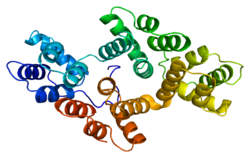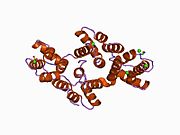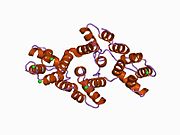Annexin A3
Appearance
Annexin A3 is a protein that in humans is encoded by the ANXA3 gene.[5][6]
It is abnormally expressed in fetuses of both IVF and ICSI, which may contribute to the increase risk of birth defects in these ART.[7]
This gene encodes a member of the annexin family. Members of this calcium-dependent phospholipid-binding protein family play a role in the regulation of cellular growth and in signal transduction pathways. This protein functions in the inhibition of phospholipase A2 and cleavage of inositol 1,2-cyclic phosphate to form inositol 1-phosphate. This protein may also play a role in anti-coagulation.[6]
References
[edit]- ^ a b c GRCh38: Ensembl release 89: ENSG00000138772 – Ensembl, May 2017
- ^ a b c GRCm38: Ensembl release 89: ENSMUSG00000029484 – Ensembl, May 2017
- ^ "Human PubMed Reference:". National Center for Biotechnology Information, U.S. National Library of Medicine.
- ^ "Mouse PubMed Reference:". National Center for Biotechnology Information, U.S. National Library of Medicine.
- ^ Tait JF, Frankenberry DA, Miao CH, Killary AM, Adler DA, Disteche CM (Aug 1991). "Chromosomal localization of the human annexin III (ANX3) gene". Genomics. 10 (2): 441–8. doi:10.1016/0888-7543(91)90330-H. PMID 1830024.
- ^ a b "Entrez Gene: ANXA3 annexin A3".
- ^ Zhang Y, Zhang YL, Feng C, et al. (September 2008). "Comparative proteomic analysis of human placenta derived from assisted reproductive technology". Proteomics. 8 (20): 4344–56. doi:10.1002/pmic.200800294. PMID 18792929. S2CID 206362532.
External links
[edit]- Human ANXA3 genome location and ANXA3 gene details page in the UCSC Genome Browser.
Further reading
[edit]- Ernst JD, Hoye E, Blackwood RA, Jaye D (1990). "Purification and characterization of an abundant cytosolic protein from human neutrophils that promotes Ca2(+)-dependent aggregation of isolated specific granules". J. Clin. Invest. 85 (4): 1065–71. doi:10.1172/JCI114537. PMC 296536. PMID 2138632.
- Ross TS, Tait JF, Majerus PW (1990). "Identity of inositol 1,2-cyclic phosphate 2-phosphohydrolase with lipocortin III". Science. 248 (4955): 605–7. Bibcode:1990Sci...248..605R. doi:10.1126/science.2159184. PMID 2159184.
- Pepinsky RB, Tizard R, Mattaliano RJ, et al. (1988). "Five distinct calcium and phospholipid binding proteins share homology with lipocortin I." J. Biol. Chem. 263 (22): 10799–811. doi:10.1016/S0021-9258(18)38041-4. PMID 2968983.
- Tait JF, Sakata M, McMullen BA, et al. (1989). "Placental anticoagulant proteins: isolation and comparative characterization four members of the lipocortin family". Biochemistry. 27 (17): 6268–76. doi:10.1021/bi00417a011. PMID 2975506.
- Tait JF, Smith C, Xu L, Cookson BT (1994). "Structure and polymorphisms of the human annexin III (ANX3) gene". Genomics. 18 (1): 79–86. doi:10.1006/geno.1993.1428. PMID 8276419.
- Sekar MC, Sambandam V, Grizzle WE, McDonald JM (1996). "Dissociation of cyclic inositol phosphohydrolase activity from annexin III". J. Biol. Chem. 271 (14): 8295–9. doi:10.1074/jbc.271.14.8295. PMID 8626524.
- Favier-Perron B, Lewit-Bentley A, Russo-Marie F (1996). "The high-resolution crystal structure of human annexin III shows subtle differences with annexin V.". Biochemistry. 35 (6): 1740–4. doi:10.1021/bi952092o. PMID 8639653.
- Bonaldo MF, Lennon G, Soares MB (1997). "Normalization and subtraction: two approaches to facilitate gene discovery". Genome Res. 6 (9): 791–806. doi:10.1101/gr.6.9.791. PMID 8889548.
- Cargill M, Altshuler D, Ireland J, et al. (1999). "Characterization of single-nucleotide polymorphisms in coding regions of human genes". Nat. Genet. 22 (3): 231–8. doi:10.1038/10290. PMID 10391209. S2CID 195213008.
- Bödeker H, Keim V, Fiedler F, et al. (2000). "PAP I interacts with itself, PAP II, PAP III, and lithostathine/regIalpha". Mol. Cell Biol. Res. Commun. 2 (3): 150–4. doi:10.1006/mcbr.1999.0166. PMID 10662590.
- Strausberg RL, Feingold EA, Grouse LH, et al. (2003). "Generation and initial analysis of more than 15,000 full-length human and mouse cDNA sequences". Proc. Natl. Acad. Sci. U.S.A. 99 (26): 16899–903. Bibcode:2002PNAS...9916899M. doi:10.1073/pnas.242603899. PMC 139241. PMID 12477932.
- Gevaert K, Goethals M, Martens L, et al. (2004). "Exploring proteomes and analyzing protein processing by mass spectrometric identification of sorted N-terminal peptides". Nat. Biotechnol. 21 (5): 566–9. doi:10.1038/nbt810. PMID 12665801. S2CID 23783563.
- Gerhard DS, Wagner L, Feingold EA, et al. (2004). "The status, quality, and expansion of the NIH full-length cDNA project: the Mammalian Gene Collection (MGC)". Genome Res. 14 (10B): 2121–7. doi:10.1101/gr.2596504. PMC 528928. PMID 15489334.
- Bruneel A, Labas V, Mailloux A, et al. (2006). "Proteomics of human umbilical vein endothelial cells applied to etoposide-induced apoptosis". Proteomics. 5 (15): 3876–84. doi:10.1002/pmic.200401239. PMID 16130169. S2CID 26007149.
- Stelzl U, Worm U, Lalowski M, et al. (2005). "A human protein-protein interaction network: a resource for annotating the proteome". Cell. 122 (6): 957–68. doi:10.1016/j.cell.2005.08.029. hdl:11858/00-001M-0000-0010-8592-0. PMID 16169070. S2CID 8235923.
- Park JE, Lee DH, Lee JA, et al. (2005). "Annexin A3 is a potential angiogenic mediator". Biochem. Biophys. Res. Commun. 337 (4): 1283–7. doi:10.1016/j.bbrc.2005.10.004. PMID 16236264.








